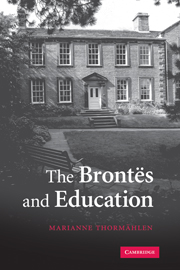Book contents
- Frontmatter
- Contents
- Acknowledgements
- Abbreviations and editions
- Introduction
- I EDUCATION AND SOCIETY
- II HOME AND SCHOOL
- 3 Household education versus school training
- 4 Parents and children
- 5 Professional educators in the home
- 6 Schools and schooling
- III SUBJECTS AND SKILLS
- IV STRATEGIES AND METHODS
- V ORIGINALITY AND FREEDOM
- Notes
- Select bibliography
- Index
3 - Household education versus school training
Published online by Cambridge University Press: 22 September 2009
- Frontmatter
- Contents
- Acknowledgements
- Abbreviations and editions
- Introduction
- I EDUCATION AND SOCIETY
- II HOME AND SCHOOL
- 3 Household education versus school training
- 4 Parents and children
- 5 Professional educators in the home
- 6 Schools and schooling
- III SUBJECTS AND SKILLS
- IV STRATEGIES AND METHODS
- V ORIGINALITY AND FREEDOM
- Notes
- Select bibliography
- Index
Summary
‘Are you book-learned?’ she inquired, presently.
‘Yes, very.’
‘But you've never been to boarding-school?’
‘I was at a boarding-school eight years.’
She opened her eyes wide. ‘Whatever cannot ye keep yourseln for, then?’
‘I have kept myself; and, I trust, shall keep myself again.’
(Jane Eyre III.iii.341)Though Moor House servant Hannah's faculties were never ‘loosened or fertilized by education’ (Jane Eyre III.iii.340), she knows what schooling is for. Having registered the destitute but well-spoken Jane's claim to respectable social rank, Hannah immediately identifies the sole area in which a middle-class woman without ‘brass’ can support herself: education. As the servant of two governesses (on temporary leave to bury a father), she is aware that formal education at a boarding school is an essential qualification for any woman who aspires to live by teaching.
Hannah's creator had possessed that knowledge since childhood. Charlotte Brontë's own schooling was a family investment in her future ability to earn a living as a teacher, with the added bonus of her being able to pass on what she had learnt to Emily and Anne. Even the period at Cowan Bridge was part of a scheme to educate the Brontë girls (except Elizabeth, who clearly was not held to be the academic type) for teaching posts. The original advertisement for the Clergy Daughters' School in the Leeds Intelligencer spoke of pupils' being fitted ‘to return with Respectability and Advantage to their own Homes, or to maintain themselves in the different Stations of Life to which Providence may call them’.
- Type
- Chapter
- Information
- The Brontës and Education , pp. 33 - 36Publisher: Cambridge University PressPrint publication year: 2007



